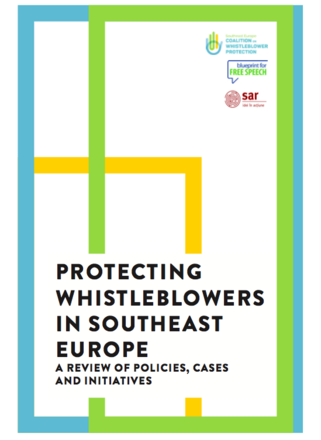
Protecting Whistleblowers in Southeast Europe: a review of policies, cases and initiatives
Over the last two years, tangible progress has been recorded in the protection of whistleblowers in Southeast Europe. Seven out of 10 countries profiled in the report now have legal guarantees in place for whistleblowers. Since 2015, new laws have been adopted or have taken effect in Albania, Macedonia, and Montenegro. Bulgaria, Croatia, and Moldova remain the only countries in the region without legal protection for whistleblowers.
Ranking legal protection
On the basis of the laws in force, the report presents a ranking with a score ranging from zero to five.
On paper, the Romanian Law on Whistleblower Protection (2004) remains the strongest, scoring 3 out of 5 points. Yet, in recent years, other countries of the region have improved their legal tools on the matter.
In 2011, Kosovo (2/5) became the first country in former Yugoslavia to pass whistleblower protection legislation. Bosnia and Herzegovina (2/5) adopted a law covering state-level employees in December 2013. In 2014, Serbia passed one of Europe’s most comprehensive whistleblower protection laws; in November 2015, Macedonia (3/5) adopted a strong whistleblower legislation, followed by Albania (3/5) in June 2016; in Montenegro (2/5), whistleblower protection was included in the new anti-corruption law that took effect in January 2016.
Three countries in the region still lack regulation in this field. Moldova is starting to develop whistleblower protection mechanisms; Bulgaria’s whistleblower protection system remains among the weakest in Europe; and Croatia also lags behind.
Missing data on implementing mechanisms
In several countries, research and anecdotal evidence detailed in this report show that new laws do not always protect citizens and employees from being fired, demoted, harassed, sued, or even prosecuted. These findings are being leveraged to close dangerous legislative gaps that expose whistleblowers to career, personal, and financial ruin.
Regardless of the level of legislation and regardless of their differing levels of freedoms and democracy, all countries in the region are dealing with almost exactly the same challenges in the spheres of media freedom and human rights. In countries where laws were recently passed – particularly in Bosnia and Herzegovina, Kosovo, Macedonia, Montenegro, and Serbia – activists and journalists are closely monitoring whether whistleblowers are benefiting from their enhanced rights, but almost all countries lack reliable statistics on whistleblowing.
The role of civil society
Along with the work of policy-makers and elected officials to pass new laws, activists and advocacy groups such as the Southeast Europe Coalition on Whistleblower Protection are expanding their political and public campaigns. In 2016 and 2017, NGO working groups were formed in Croatia, Macedonia, and Moldova to advocate for new or improved laws. Campaigners are working to fix the laws in Kosovo and Serbia, and to pass entity-level laws in Bosnia and Herzegovina.
This report is an update of a 2015 report published by the Regional Anti-Corruption Initiative and was released as the Southeast Europe Coalition on Whistleblower Protection completed its second year in operation.
Tags: Whistleblowing Investigative journalism Access to information European Court of Human Rights EU Member StatesThe content of this article can be used according to the terms of Creative Commons: Attribution-NonCommercial 4.0 International (CC BY-NC 4.0) . To do so use the the wording "this article was originally published on the Resource Centre on Media Freedom in Europe" including a direct active link to the original article page.

